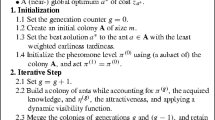Abstract
In recent years, decision makers give more importance to the maintenance function, viewing its substantial contribution to business productivity. However, most literature on scheduling studies does not take into account maintenance planning when implementing production schedules. The achievement of production plan without taking into account maintenance activities increases the probability of machine breakdowns, and inversely, considering maintenance actions in production planning elongates the achievement dates of orders and affects deadlines. In this paper, we propose a bi-objective model to deal with production scheduling and maintenance planning problems simultaneously. The performance criteria considered for production and maintenance are, respectively, the total tardiness and the unavailability of the production system. The start times of preventive maintenance actions and their number are not fixed in advance but considered, with the execution dates of production tasks, as decisions variables of the problem. The solution of the integrated model is based on multi-objective ant colony optimization approach. The proposed algorithm (Pareto ant colony optimization) is compared, on the basis of several metrics, with well-known multi-objective genetic algorithms, namely NSGA-II and SPEA 2, and a hybrid particle swarm optimization algorithm. Interesting results are obtained via empirical study.
Similar content being viewed by others
References
Abido MA (2010) Multiobjective particle swarm optimization with nondominated local and global sets. Nat Comput 9(3):747–766
Berrichi A, Amodeo L, Yalaoui F, Châtelet E, Mezghiche M (2009) Bi-objective optimization algorithms for joint production and maintenance scheduling: application to the parallel machine problem. J Intell Manuf 20:389–400
Berrichi A, Yalaoui F, Amodeo L, Mezghiche M (2010) Bi-objective ant colony optimization approach to optimize production and maintenance scheduling. Comput Oper Res 37:1584–1596
Cassady CR, Kutanoglu E (2003) Minimizing job tardiness using integrated preventive maintenance planning and production scheduling. IIE Trans 35:503–513
Deb K, Pratap A, Agarwal S, Meyarivan T (2002) A fast and elitist multiobjective genetic algorithm: NSGA-II. IEEE Trans Evol Comput 6(2):182–197
Dorigo M, Maniezzo V, Colorni A (1996) The ant system: optimization by a colony of cooperating agents. IEEE Transactions on Systems, Man, and Cybernetics Part B 26(1):29–41
Ebeling CE (1997) An introduction to reliability and maintainability engineering. McGraw-Hill, USA
Garey MR, Johnson DS (1979) Computers and intractability: a guide to the theory of NP-completeness. W.H. Freeman and Company, San Francisco California
Garcıa-Martınez C, Cordon O, Herrera F (2007) A taxonomy and an empirical analysis of multiple objective ant colony optimization algorithms for the bi-criteria TSP. Eur J Oper Res 180:116–148
Ishibuchi H, Yoshida T, Murata T (2003) Balance between genetic search and local search in mimetic algorithms for multiobjective permutation flowshop scheduling. IEEE Trans Evol Comput 7(2):204–223
Kaabi J, Varnier C, Zerhouni N (2002) Heuristics for scheduling maintenance and production on a single machine. IEEE Conference on Systems, Man and Cybernetics. October 6–9 Hammamet, Tunisia
Kaabi J, Varnier C, Zerhouni N (2003) Genetic algorithm for scheduling production and maintenance in a Flow Shop. Laboratory of automatic of Besançon, France (in French)
Kennedy J, Eberhart R (1995) Particle swarm optimization. IEEE International Conference on Neural Network 1942–1948
Krichen S, Dahmani N (2010) A particle swarm optimization approach for the bi-objective load balancing problem. Electronic Notes in Discrete Mathematics 36(1):751–758
Lee C-Y (1996) Machine scheduling with an availability constraint. J Glob Optim 9:395–416
Lei D (2008) A Pareto archive particle swarm optimization for multi-objective job shop scheduling. Comput Ind Eng 54(4):960–971
Liu DS, Tan KC, Huang SY, Goh CK, Ho WK (2008) On solving multiobjective bin packing problems using evolutionary particle swarm optimization. Eur J Oper Res 190(2):357–382
Niu K, Zhou T, Wang L (2010) A hybrid particle swarm optimization for parallel machine total tardiness scheduling. Int J Adv Manuf Technol 49(5–8):723–739
Montalvo I, Izquierdo J, Schwarze S, Pérez-García R (2010) Multi-objective particle swarm optimization applied to water distribution systems design: an approach with human interaction. Math Comput Model 52(7–8):1219–1227
Rabbani M, Aramoon Bajestani M, Baharian Khoshkhou G (2010) A multi-objective particle swarm optimization for project selection problem. Expert Syst Appl 37(1):315–321
Raghavan NRS, Venkataramana M (2009) Parallel processor scheduling for minimizing total weighted tardiness using ant colony optimisation. Int J Adv Manuf Technol 41:986–996
Rezaie H, Farhad Mardukhi N (2010) A multi-objective particle swarm optimization for web service composition. Communications in computer and information science1, volume 88. Networked Digital Technologies Part 2:112–122
Poli R (2008) Analysis of the publications on the applications of particle swarm optimisation. Journal of Artificial Evolution and Applications. Hindawi Publishing Corp, New York
Ruiz R, García-Diaz JC, Maroto C (2007) Considering scheduling and preventive maintenance in the flowshop sequencing problem. Comput Oper Res 34(11):3314–3330
Sarayloo F, Tavakkoli-Moghaddam R (2010) Multi objective particle swarm optimization for a dynamic cell formation problem, Proceedings of the World Congress on Engineering III WCE 2010, London, U.K
Schmidt G (2000) Scheduling with limited machine availability. Eur J Oper Res 121:1–15
Tasgetiren MF, Sevkli M, Liang Y-C, Gencyilmaz G (2004) Particle swarm optimization algorithm for single machine total weighted tardiness problem. Congress on Evolutionary Computation 2:1412–1419
Tsai C-Y, Yeh S-W (2008) A multiple objective particle swarm optimization approach for inventory classification. Int J Prod Econ 114(2):656–666
Villemeur A (1991) Reliability, availability, maintainability and safety assessment. Wiley, USA
Zhang G, Shao X, Li P, Gao L (2009) An effective hybrid particle swarm optimization algorithm for multi-objective flexible job-shop scheduling problem. Comput Ind Eng 56(4):1309–1318
Zitzler E, Laumanns M, Thiele L (2002) SPEA2: improving the strength Pareto evolutionary algorithm for multiobjective optimization. In: Giannakoglou K, Tsahalis D, Periaux J, Papailou P, Fogarty T (eds) EUROGEN 2001, evolutionary methods for design, optimization, and control with applications to industrial problems. Barcelona, Spain, CIMNE, pp 95–100
Xu D, Sun K, Li H (2008) Parallel machine scheduling with almost periodic non-preemptive maintenance and jobs to minimize makespan. Comput Oper Res 35:1344–1349
Author information
Authors and Affiliations
Corresponding author
Rights and permissions
About this article
Cite this article
Berrichi, A., Yalaoui, F. Efficient bi-objective ant colony approach to minimize total tardiness and system unavailability for a parallel machine scheduling problem. Int J Adv Manuf Technol 68, 2295–2310 (2013). https://doi.org/10.1007/s00170-013-4841-0
Received:
Accepted:
Published:
Issue Date:
DOI: https://doi.org/10.1007/s00170-013-4841-0




